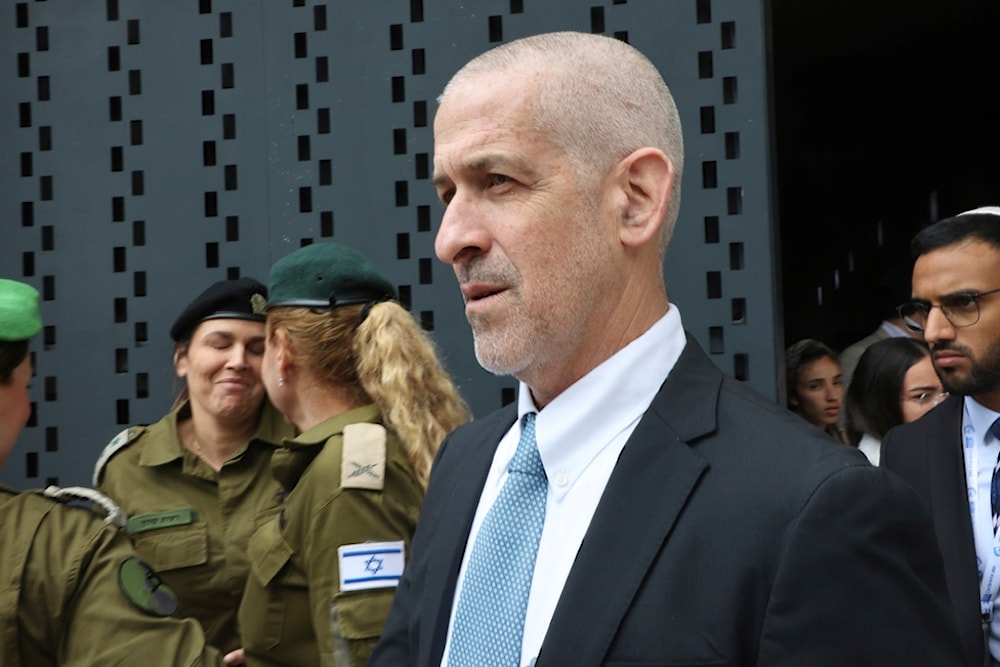Israeli supreme court rules Shin Bet chief to stay amid legal dispute
The court has also proposed that the Israeli government and the attorney general reach an agreement on the matter, setting a deadline for April 20.
-
 Ronen Bar, chief of "Israel's" domestic Shin Bet security agency, attends a ceremony at occupied al-Quds' Mount Herzl military cemetery, on May 13, 2024 (AP)
Ronen Bar, chief of "Israel's" domestic Shin Bet security agency, attends a ceremony at occupied al-Quds' Mount Herzl military cemetery, on May 13, 2024 (AP)
"Israel's" Supreme Court issued on Tuesday an interim injunction requiring Shin Bet Chief Ronen Bar to remain in his position until further notice while the Israeli government and the attorney general’s office attempt to resolve the ongoing legal dispute regarding his dismissal, Israeli media reported.
The court has also proposed that the government and the attorney general reach an agreement on the matter, setting a deadline for April 20, the day following the Jewish Passover holiday.
Last month, Netanyahu announced that his government had unanimously approved a motion to dismiss Bar, citing "lack of trust" and ordering him to vacate his position by April 10.
"Since we saw some sparks of willingness here... we are giving you until after Passover (which ends on April 19) to try to reach some kind of creative solution that is agreed upon" by both sides, Supreme Court President Yitzhak Amit said.
Cabinet Secretary Yossi Fuchs, alongside representatives from the Attorney General’s Office, appeared open to negotiating a resolution, The Times of Israel indicated.
Justice Noam Sohlberg initially suggested sending the issue to the advisory committee for senior civil service appointments to seek a recommendation.
The court has instructed the government not to take any action to remove Bar from office while the injunction is in effect. This includes refraining from declaring a replacement or altering the authority or working relationship between the Shin Bet and the government.
Meanwhile, Israeli Communications Minister Shlomo Karhi, from Netanyahu's Likud party, has signaled that the government may defy the court's order.
In response to news of the court’s decision, Karhi posted a vehement "No!" on X, stressing the government's duty to obey Israeli law, "not to an illegal order with no authority."
“The ‘creative solution’ is very simple: Ronen Bar will end his term on April 10, that’s our obligation,” Karhi wrote.
“What is democratic about the absolute rule of Yitzhak Amit????” he added, referring to the Supreme Court president.
On their part, Israeli opposition leaders are calling on the government to respect the court’s interim injunction. National Unity leader Benny Gantz urged the government "to obey the court ruling,” warning that “not allowing the head of the Shin Bet into discussions and boycotting him is playing with lives.”
Yair Golan, head of the left-wing Democrats, cautioned the government against defying the ruling, warning that “any attempt to evade the High Court will be met by an unprecedented civil struggle by the determined democratic majority.”
“A government that does not obey the law cannot remain in office for a single day more,” he underscored.
'No court in the world is run this way'
Tuesday's hearing followed petitions from opposition parties and non-profit organizations questioning the legality of the government's decision, which the Supreme Court had already frozen pending a ruling.
Protests erupted outside the courtroom in occupied al-Quds, and inside, interruptions and shouts forced the judges to suspend the proceedings after just 30 minutes.
"No court in the world is run this way," Amit remarked after warning both government supporters and critics, who disrupted the live-broadcast hearing.
Amit called for a break, during which tensions continued to escalate outside the courtroom.
The hearing resumed roughly an hour later, without an audience, to ensure all parties could argue their case "without fear," according to the judges.
Attorney Zion Amir, representing the government, described the petition as "purely" political.
Bar has strongly opposed the government's move to remove him, dismissing Netanyahu's reasons as "general, unsubstantiated accusations" driven by "personal interest".
Bar argued that the dismissal was intended to prevent investigations into the events surrounding the October 7 attack by the Palestinian Resistance and other critical matters being handled by Shin Bet.
Attorney General Gali Baharav-Miara has also warned that the effort to oust Bar was "tainted by a personal conflict of interest on the part of the prime minister due to the criminal investigations involving his associates."
Baharav-Miara was referring to what Israeli media refer to as the "Qatargate" case, in which Netanyahu's close advisors are being investigated for allegedly receiving money from Qatar.
Baharav-Miara, who has frequently clashed with Netanyahu's government over judicial independence, expressed concern that removing Bar could lead to the politicization of the Shin Bet leadership.
Appointed Shin Bet chief in October 2021 by the previous government, which opposed Netanyahu, Bar has had tense relations with Netanyahu since his return to office in late 2022.
Bar had been critical of the government's proposed judicial reforms, which sparked massive protests in "Israel". The reforms were temporarily suspended after the start of the Israeli war on Gaza in 2023.
Although Bar’s term was set to end next year, he had previously suggested he might step down early due to his involvement in the failure to prevent the October 7 attack, but only after the war concluded and the captives in Gaza were retrieved.
Read more: Shin Bet chief says Netanyahu asked him to falsely testify in court

 5 Min Read
5 Min Read








